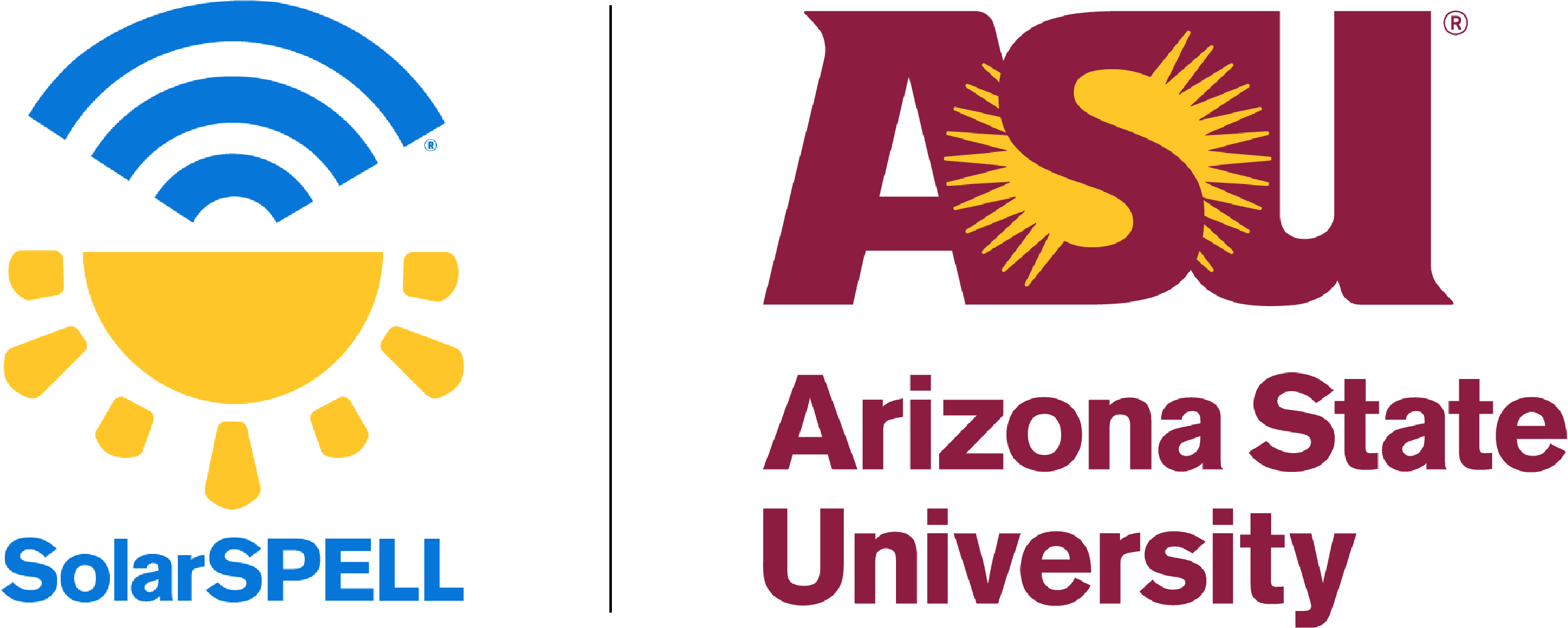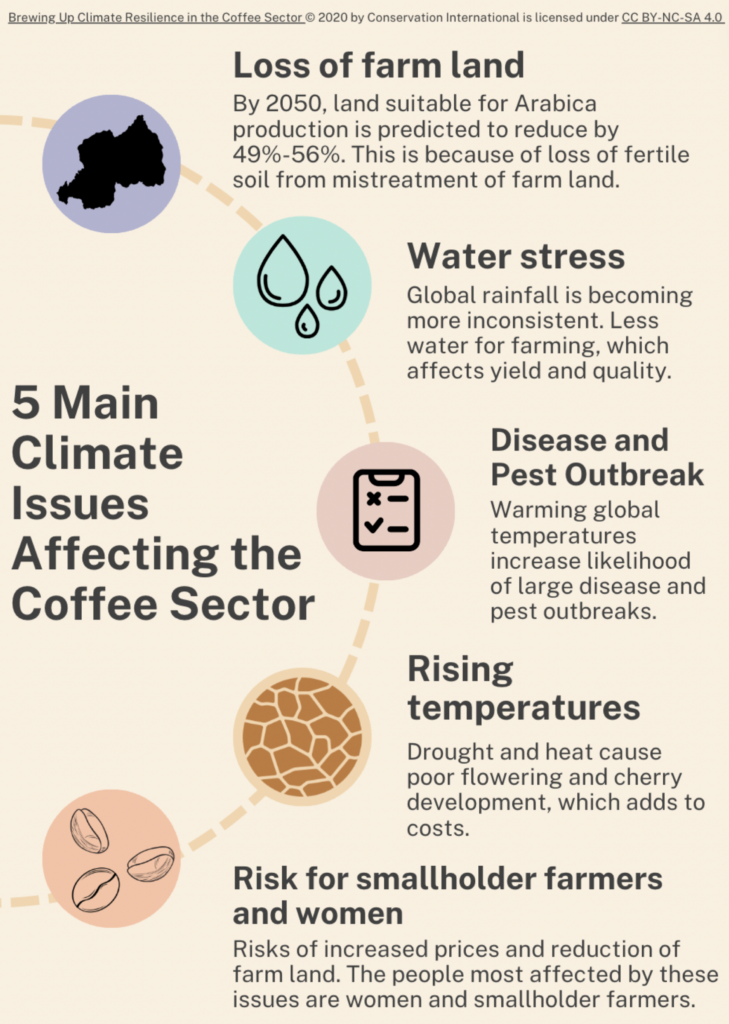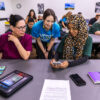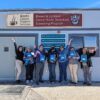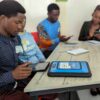By Cassie Barrett, SolarSPELL Student Engagement Coordinator
Students are the glue that holds the ASU SolarSPELL Initiative together. We are able to reach communities around the world and curate local, specific resources for in-country partners because of the students that have worked to support our mission of global access to information. Since 2019, SolarSPELL has worked with over 400 student interns. The student teams are diverse and range from library management to software development, marketing and communications to monitoring and evaluation. SolarSPELL works with multiple colleges across ASU and various universities around the United States and the globe to find qualified, motivated students with a global perspective.
This past semester, SolarSPELL worked with 47 students on 19 student teams; they contributed more than 3,400 hours! 70% were ASU students, while 30% joined us from 11 other universities, including Florida State University and University of Washington. Here’s a brief look at some of the amazing teams that worked with SolarSPELL this semester, including the graphic design team, agriculture content curation team, and Master of Library and Information Science (MLIS) Team.
Building out SolarSPELL’s visual identity
This spring we were joined by two incredibly talented graphic designers, who took on a plethora of challenging design projects. One we are particularly excited about is the creation of our new mascot, SPELLY! Lauren Fink, a senior graphic design major at ASU’s Herberger Institute for Design and the Arts, developed this adorable character to help us champion global access to education and information literacy! Be on the lookout for SPELLY as the year continues.

Lauren also designed SolarSPELL t-shirts that highlight the importance of information literacy. [Information literacy is the ability to identify, locate, evaluate and use information.] Building information literacy skills is a core piece of SolarSPELL’s mission and is taught at every SolarSPELL training. Dr. Hosman considers information literacy a superpower, which is what these t-shirts will convey.
Sophia Zuo, a recent Communications Design graduate from Parsons School of Design, created social media banners for SolarSPELL’s LinkedIn, X, Facebook and YouTube channels, providing a much needed visual refresh to our online presence. She also designed a new pop up banner that SolarSPELL can use at various events around campus, as well as new icons that will appear next to resources listed in our education libraries. The icons represent categories such as activities and exploration, teaching resources, and short-form vs. long-form PDFs, which will make it easier than ever for library users to locate the resources they need quickly!
Curating and creating accessible, localized agriculture resources
SolarSPELL’s agriculture collection aims to provide agriculture extension agents with extensive resources on Conservation Agriculture, so they can better help smallholder farmers adapt to climate change and increase their yields. This past semester’s agriculture curation team — Zoe Winick from ASU’s School for the Future of Innovation and Society, Maddy Pennell from ASU’s School of Sustainability, Shaela Patel from ASU’s School of Biological and Health Systems Engineering, and Hannah Johnson, who studies environmental sciences and technology at the University of Maryland — helped not only curate but also create new content for this collection.
As with all our collections, our Rwanda Agriculture Library includes many resources in Kinyarwanda — the primary language spoken in Rwanda — but there is still a shortage of digital Kinyarwanda content available for curation. And many English-language agriculture resources are not accessible for those with low literacy or English proficiency. In order to bridge this gap and provide extension agents with outreach materials that are more accessible to the average Rwandan farmer, our agriculture curation team took it upon themselves to synthesize long articles into simple infographics about farming best practices. And by using lots of pictures and fewer words, they created resources that can be used in many countries around the world. The infographic on the right, for instance, explains the main climate issues affecting the coffee sector.
Recently, SolarSPELL’s co-founders Bruce Baikie and Dr. Laura Hosman, had the opportunity to travel to Madagascar to explore a potential collaboration with Programme Pfumvudza Crown utilizing the SolarSPELL agriculture library. Our agriculture team quickly curated, uploaded and metadata tagged videos in Malgasy, the native language of Madagascar, enabling Bruce and Dr. Hosman to demonstrate the type of local resources that would be available for a Madagascar SolarSPELL library.
Developing a metadata crash course for future interns
Metadata is data about data; in our case, it’s the information and keywords associated with each resource in our library that enables them to be searchable. For example, a PDF of a children’s story written in English may have the following metadata tags in addition to its title, description and publication information: Story, Book, English, Education, Reading, Early Reading, etc. Each semester, a cohort of metadata interns helps us metadata tag new resources before we add them to the library. This semester we also had a team of MLIS students, who created a website to serve as a training tool and resource for new metadata interns!
MLIS stands for Master of Library and Information Science. Basically, this team is made up of library experts. Due to the knowledge and background experience of our MLIS team, they were able to have a large impact on the sustainability of our library moving forward. Because ASU does not have an MLIS program, this team was made of students from universities around the country. The three star students include: Thomasina Muckenfuss from University of North Carolina: Greensboro: School of Education, Mak Jones from the University of Arizona, and Alexandra Gianakopoulos from University of Illinois Urbana-Champaign.
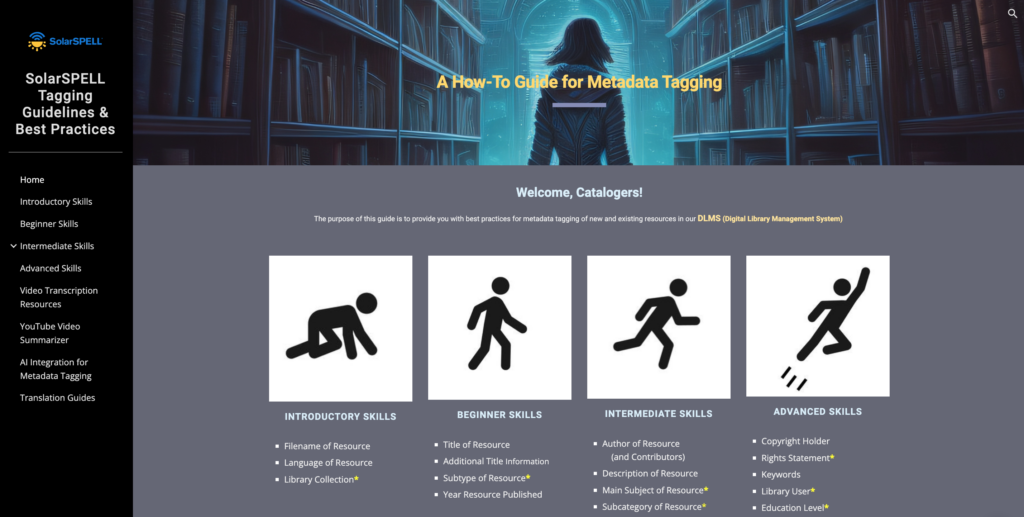
The website this team created is a crash course in metadata. It explains what metadata is and how to metadata tag various resources, including videos and content in other languages. It has videos, tutorials, knowledge checks and in-depth explanations. This site is an expansion of our previous metadata training, which consisted of videos emailed to students. The creation of this website allows for real time updates and expands on the previous training by breaking it down in more detail. The MLIS team also conducted research on how SolarSPELL could leverage AI to help us categorize library resources more efficiently. Additionally, they supported the re-categorization of our current education library to make resources easier to find for our in-country partners.
To get involved with SolarSPELL and do awesome work like the teams listed above, visit solarspell.org/student-opportunities.
